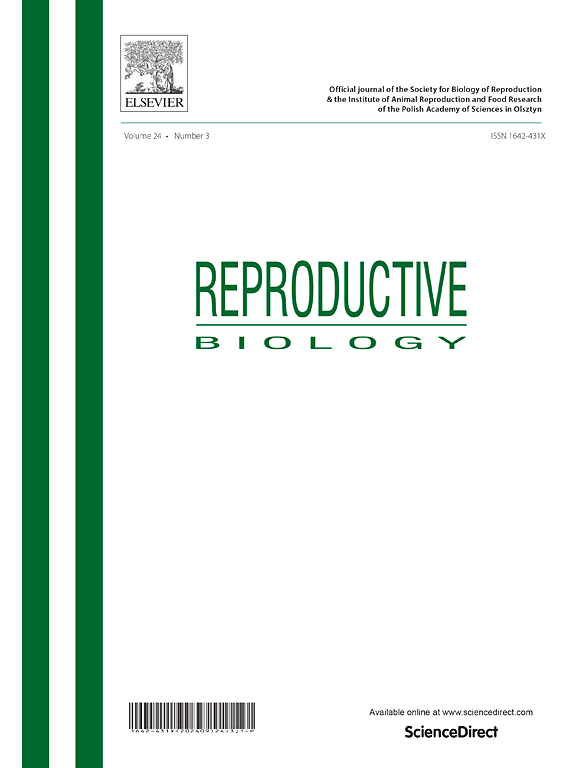Exploring critical hub genes and potential drug candidates for PCOS: A systems biology approach
IF 2.5
3区 生物学
Q3 REPRODUCTIVE BIOLOGY
引用次数: 0
Abstract
Polycystic ovarian syndrome (PCOS) is widely recognized as the most common endocrine disorder in women of reproductive age. We aimed to identify PCOS-related genes by searching the Gene Expression Omnibus (GEO) database, and subsequently used the DESeq2 tool in the R program to identify differentially expressed genes. We constructed a protein-protein interaction (PPI) network for the upregulated genes in PCOS and applied the MCODE algorithm to identify significant clustering groups and hub candidates. Additionally, we performed an enrichment analysis using the ClueGO plugin to explore the biological processes and pathways associated with the upregulated genes. We successfully obtained the dataset GSE155489 from the GEO database and identified 198 elevated genes. The biological functions associated with the upregulated genes were predominantly related to steroid binding, chemokine activity, and pyridoxal phosphate binding. Results from the molecular docking study indicated that three drugs, namely Ponatinib, Dihydroergotamine, and Paliperidone, exhibited the lowest binding affinity energy and displayed the highest interaction with the most critical hub genes identified through the PPI network analysis (WNT5A, SERPINE1, and CXCR4). In summary, our findings highlight several crucial genes involved in PCOS and suggest that Ponatinib, Dihydroergotamine, and Paliperidone may have a significant impact on these genes. However, it is important to note that further research and well-designed clinical trials are necessary, as there is limited evidence from small-population clinical trials regarding the repurposing of drugs for PCOS. Advancements in PCOS knowledge will aid in the development of innovative medications for the disorder.
探索多囊卵巢综合征的关键枢纽基因和潜在候选药物:系统生物学方法
多囊卵巢综合征(PCOS)是公认的育龄妇女最常见的内分泌疾病。我们的目标是通过检索Gene Expression Omnibus (GEO)数据库来鉴定pcos相关基因,随后使用R程序中的DESeq2工具鉴定差异表达基因。我们构建了PCOS中上调基因的蛋白相互作用(protein-protein interaction, PPI)网络,并应用MCODE算法识别显著聚类群和候选中心。此外,我们使用ClueGO插件进行了富集分析,以探索与上调基因相关的生物学过程和途径。我们成功地从GEO数据库中获得了数据集GSE155489,并鉴定出198个升高基因。与上调基因相关的生物学功能主要与类固醇结合、趋化因子活性和磷酸吡哆醛结合有关。分子对接研究结果显示,Ponatinib、dihydro麦角胺和palperidone三种药物的结合亲和能最低,与PPI网络分析发现的最关键枢纽基因(WNT5A、SERPINE1和CXCR4)的相互作用最高。总之,我们的研究结果强调了与PCOS有关的几个关键基因,并表明波纳替尼、双氢麦角胺和帕利哌酮可能对这些基因有重大影响。然而,值得注意的是,进一步的研究和精心设计的临床试验是必要的,因为关于多囊卵巢综合征药物再利用的小人群临床试验证据有限。多囊卵巢综合征知识的进步将有助于开发针对该疾病的创新药物。
本文章由计算机程序翻译,如有差异,请以英文原文为准。
求助全文
约1分钟内获得全文
求助全文
来源期刊

Reproductive biology
生物-生殖生物学
CiteScore
3.90
自引率
0.00%
发文量
95
审稿时长
29 days
期刊介绍:
An official journal of the Society for Biology of Reproduction and the Institute of Animal Reproduction and Food Research of Polish Academy of Sciences in Olsztyn, Poland.
Reproductive Biology is an international, peer-reviewed journal covering all aspects of reproduction in vertebrates. The journal invites original research papers, short communications, review articles and commentaries dealing with reproductive physiology, endocrinology, immunology, molecular and cellular biology, receptor studies, animal breeding as well as andrology, embryology, infertility, assisted reproduction and contraception. Papers from both basic and clinical research will be considered.
 求助内容:
求助内容: 应助结果提醒方式:
应助结果提醒方式:


